Clorox Company and Plastic Recycling: A UK Sustainability Analysis
VerifiedAdded on 2022/12/28
|11
|3471
|1
Report
AI Summary
This report presents an individual literature review focusing on the environmental factor of increasing plastic recycling to meet sustainability issues in the UK, specifically analyzing the Clorox company. The report begins with an introduction to the STEEPLE analysis and the problem of plastic pollution, followed by a literature review exploring plastic usage, its environmental impact, sustainability, and the importance of recycling. The review examines problems related to plastic waste in the UK and Clorox's initiatives, considering the company's role in plastic packaging and sustainability efforts. The report uses multiple sources to provide a comprehensive overview of Clorox's actions and the broader context of plastic recycling. The report concludes by discussing the relevance of Clorox's actions in the context of the UK's sustainability goals.
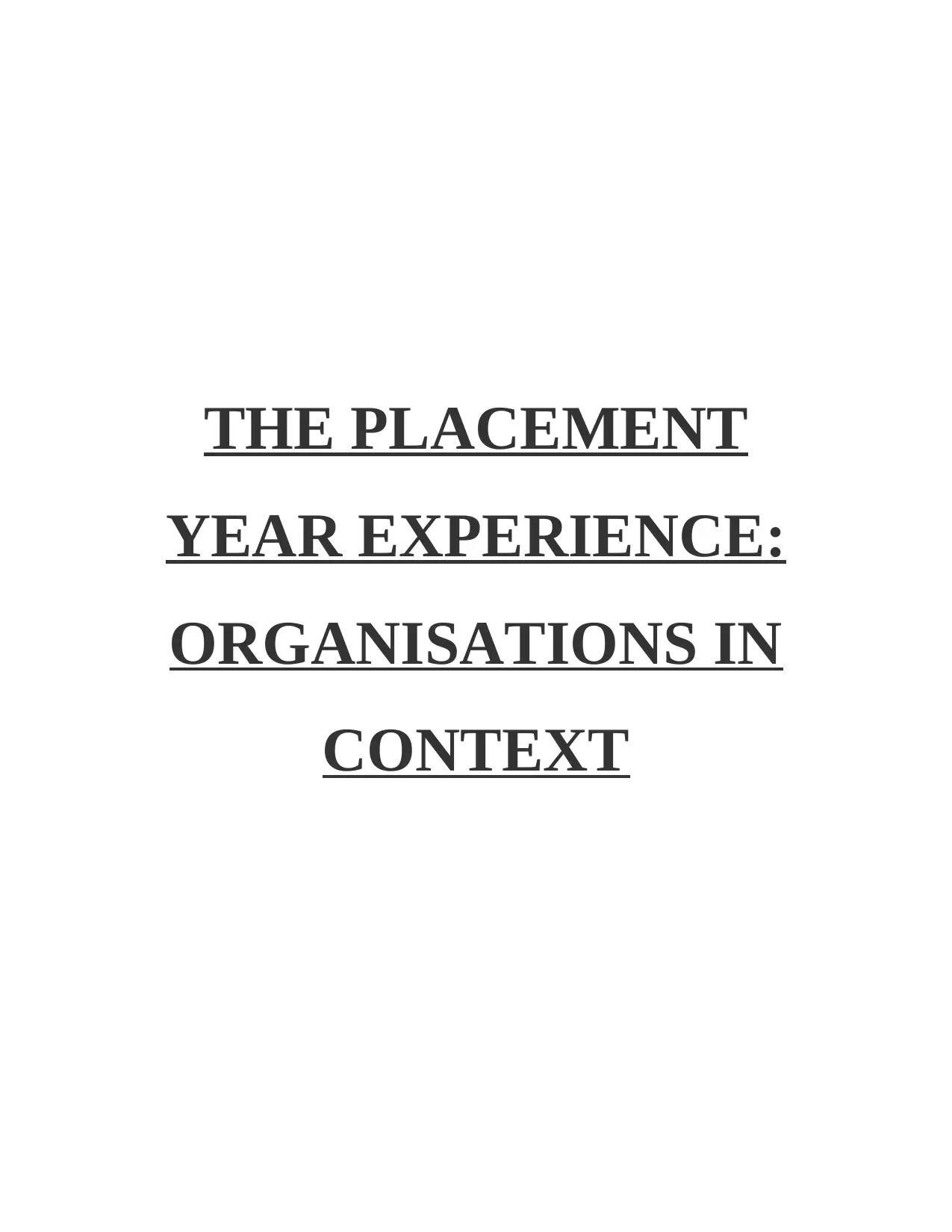
THE PLACEMENT
YEAR EXPERIENCE:
ORGANISATIONS IN
CONTEXT
YEAR EXPERIENCE:
ORGANISATIONS IN
CONTEXT
Paraphrase This Document
Need a fresh take? Get an instant paraphrase of this document with our AI Paraphraser
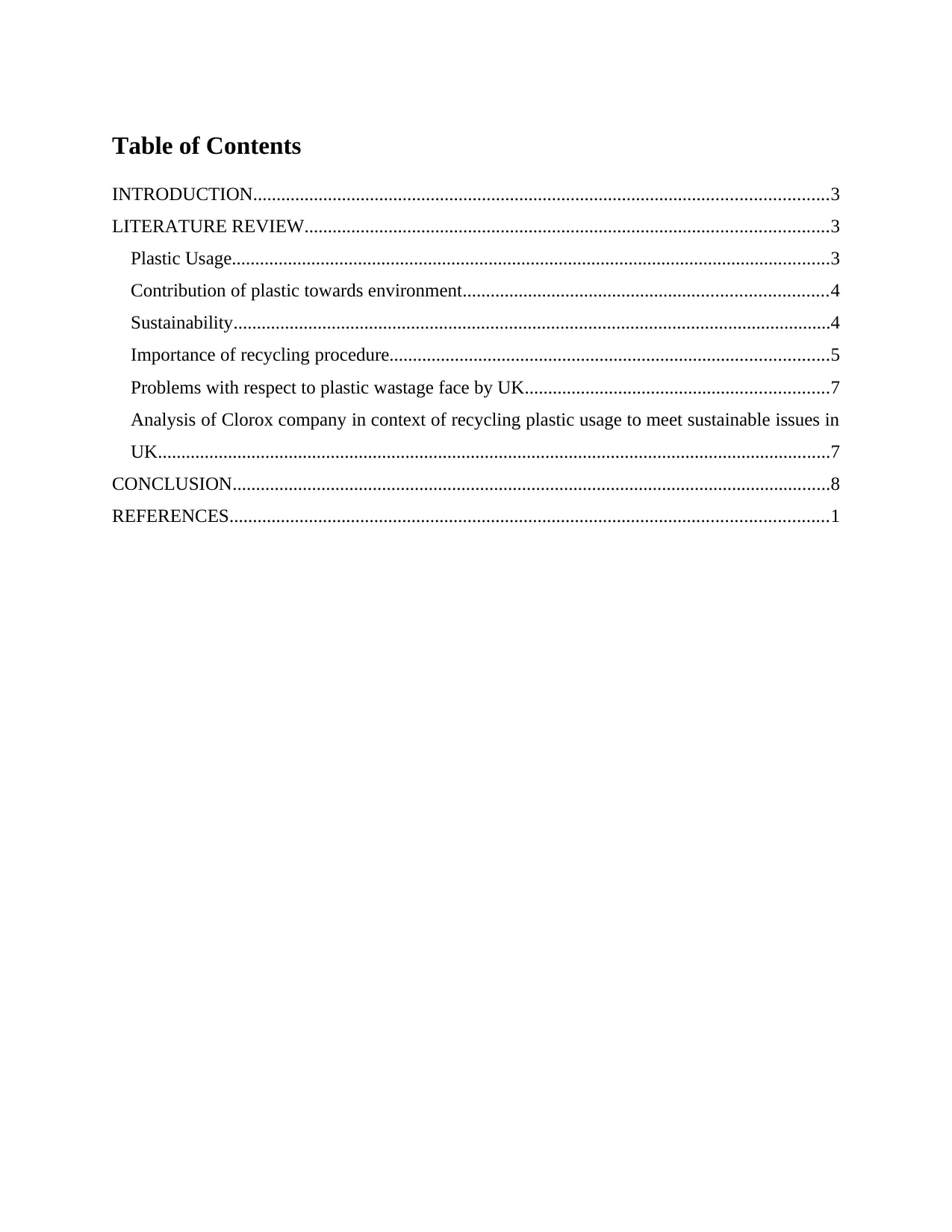
Table of Contents
INTRODUCTION...........................................................................................................................3
LITERATURE REVIEW................................................................................................................3
Plastic Usage................................................................................................................................3
Contribution of plastic towards environment..............................................................................4
Sustainability................................................................................................................................4
Importance of recycling procedure..............................................................................................5
Problems with respect to plastic wastage face by UK.................................................................7
Analysis of Clorox company in context of recycling plastic usage to meet sustainable issues in
UK................................................................................................................................................7
CONCLUSION................................................................................................................................8
REFERENCES................................................................................................................................1
INTRODUCTION...........................................................................................................................3
LITERATURE REVIEW................................................................................................................3
Plastic Usage................................................................................................................................3
Contribution of plastic towards environment..............................................................................4
Sustainability................................................................................................................................4
Importance of recycling procedure..............................................................................................5
Problems with respect to plastic wastage face by UK.................................................................7
Analysis of Clorox company in context of recycling plastic usage to meet sustainable issues in
UK................................................................................................................................................7
CONCLUSION................................................................................................................................8
REFERENCES................................................................................................................................1
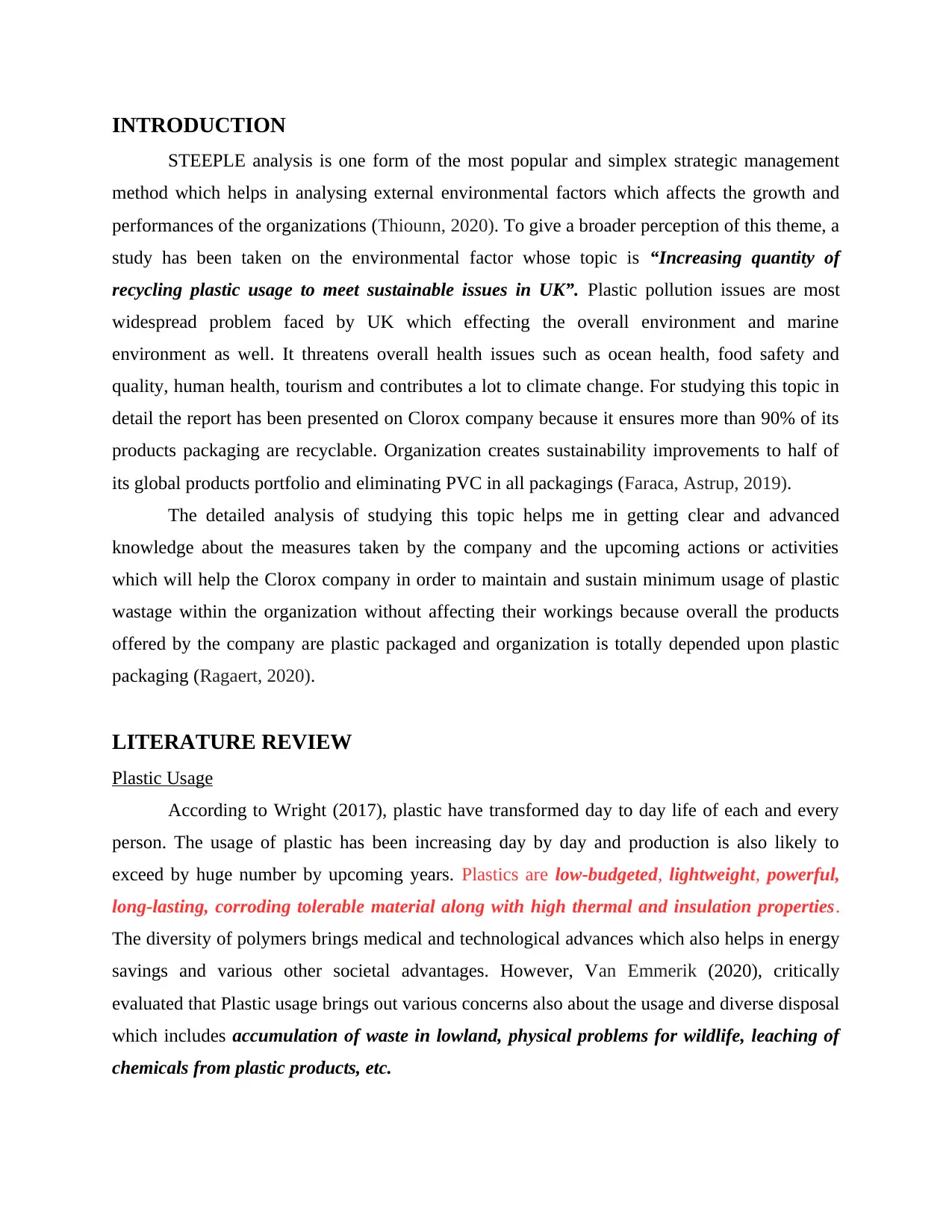
INTRODUCTION
STEEPLE analysis is one form of the most popular and simplex strategic management
method which helps in analysing external environmental factors which affects the growth and
performances of the organizations (Thiounn, 2020). To give a broader perception of this theme, a
study has been taken on the environmental factor whose topic is “Increasing quantity of
recycling plastic usage to meet sustainable issues in UK”. Plastic pollution issues are most
widespread problem faced by UK which effecting the overall environment and marine
environment as well. It threatens overall health issues such as ocean health, food safety and
quality, human health, tourism and contributes a lot to climate change. For studying this topic in
detail the report has been presented on Clorox company because it ensures more than 90% of its
products packaging are recyclable. Organization creates sustainability improvements to half of
its global products portfolio and eliminating PVC in all packagings (Faraca, Astrup, 2019).
The detailed analysis of studying this topic helps me in getting clear and advanced
knowledge about the measures taken by the company and the upcoming actions or activities
which will help the Clorox company in order to maintain and sustain minimum usage of plastic
wastage within the organization without affecting their workings because overall the products
offered by the company are plastic packaged and organization is totally depended upon plastic
packaging (Ragaert, 2020).
LITERATURE REVIEW
Plastic Usage
According to Wright (2017), plastic have transformed day to day life of each and every
person. The usage of plastic has been increasing day by day and production is also likely to
exceed by huge number by upcoming years. Plastics are low-budgeted, lightweight, powerful,
long-lasting, corroding tolerable material along with high thermal and insulation properties.
The diversity of polymers brings medical and technological advances which also helps in energy
savings and various other societal advantages. However, Van Emmerik (2020), critically
evaluated that Plastic usage brings out various concerns also about the usage and diverse disposal
which includes accumulation of waste in lowland, physical problems for wildlife, leaching of
chemicals from plastic products, etc.
STEEPLE analysis is one form of the most popular and simplex strategic management
method which helps in analysing external environmental factors which affects the growth and
performances of the organizations (Thiounn, 2020). To give a broader perception of this theme, a
study has been taken on the environmental factor whose topic is “Increasing quantity of
recycling plastic usage to meet sustainable issues in UK”. Plastic pollution issues are most
widespread problem faced by UK which effecting the overall environment and marine
environment as well. It threatens overall health issues such as ocean health, food safety and
quality, human health, tourism and contributes a lot to climate change. For studying this topic in
detail the report has been presented on Clorox company because it ensures more than 90% of its
products packaging are recyclable. Organization creates sustainability improvements to half of
its global products portfolio and eliminating PVC in all packagings (Faraca, Astrup, 2019).
The detailed analysis of studying this topic helps me in getting clear and advanced
knowledge about the measures taken by the company and the upcoming actions or activities
which will help the Clorox company in order to maintain and sustain minimum usage of plastic
wastage within the organization without affecting their workings because overall the products
offered by the company are plastic packaged and organization is totally depended upon plastic
packaging (Ragaert, 2020).
LITERATURE REVIEW
Plastic Usage
According to Wright (2017), plastic have transformed day to day life of each and every
person. The usage of plastic has been increasing day by day and production is also likely to
exceed by huge number by upcoming years. Plastics are low-budgeted, lightweight, powerful,
long-lasting, corroding tolerable material along with high thermal and insulation properties.
The diversity of polymers brings medical and technological advances which also helps in energy
savings and various other societal advantages. However, Van Emmerik (2020), critically
evaluated that Plastic usage brings out various concerns also about the usage and diverse disposal
which includes accumulation of waste in lowland, physical problems for wildlife, leaching of
chemicals from plastic products, etc.
⊘ This is a preview!⊘
Do you want full access?
Subscribe today to unlock all pages.

Trusted by 1+ million students worldwide
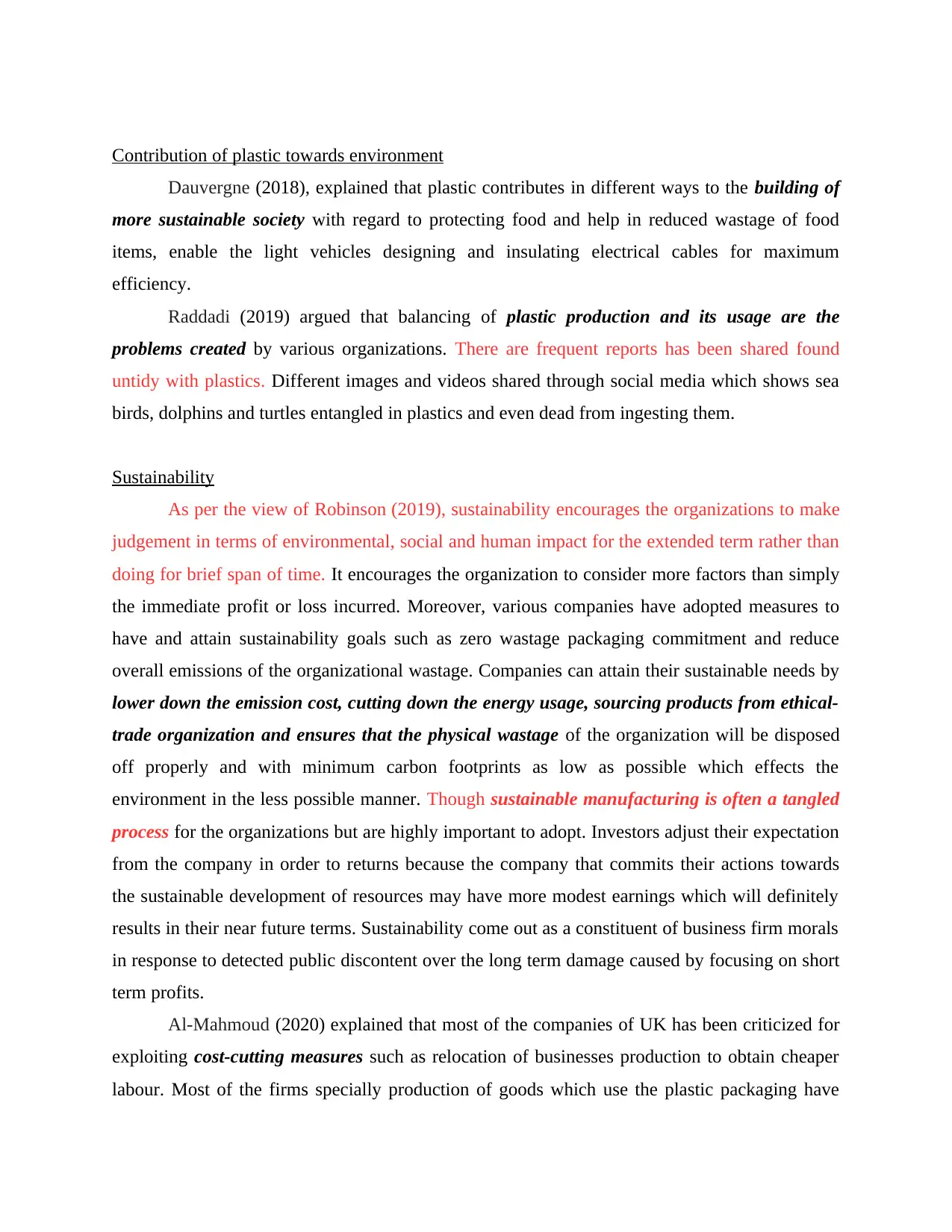
Contribution of plastic towards environment
Dauvergne (2018), explained that plastic contributes in different ways to the building of
more sustainable society with regard to protecting food and help in reduced wastage of food
items, enable the light vehicles designing and insulating electrical cables for maximum
efficiency.
Raddadi (2019) argued that balancing of plastic production and its usage are the
problems created by various organizations. There are frequent reports has been shared found
untidy with plastics. Different images and videos shared through social media which shows sea
birds, dolphins and turtles entangled in plastics and even dead from ingesting them.
Sustainability
As per the view of Robinson (2019), sustainability encourages the organizations to make
judgement in terms of environmental, social and human impact for the extended term rather than
doing for brief span of time. It encourages the organization to consider more factors than simply
the immediate profit or loss incurred. Moreover, various companies have adopted measures to
have and attain sustainability goals such as zero wastage packaging commitment and reduce
overall emissions of the organizational wastage. Companies can attain their sustainable needs by
lower down the emission cost, cutting down the energy usage, sourcing products from ethical-
trade organization and ensures that the physical wastage of the organization will be disposed
off properly and with minimum carbon footprints as low as possible which effects the
environment in the less possible manner. Though sustainable manufacturing is often a tangled
process for the organizations but are highly important to adopt. Investors adjust their expectation
from the company in order to returns because the company that commits their actions towards
the sustainable development of resources may have more modest earnings which will definitely
results in their near future terms. Sustainability come out as a constituent of business firm morals
in response to detected public discontent over the long term damage caused by focusing on short
term profits.
Al-Mahmoud (2020) explained that most of the companies of UK has been criticized for
exploiting cost-cutting measures such as relocation of businesses production to obtain cheaper
labour. Most of the firms specially production of goods which use the plastic packaging have
Dauvergne (2018), explained that plastic contributes in different ways to the building of
more sustainable society with regard to protecting food and help in reduced wastage of food
items, enable the light vehicles designing and insulating electrical cables for maximum
efficiency.
Raddadi (2019) argued that balancing of plastic production and its usage are the
problems created by various organizations. There are frequent reports has been shared found
untidy with plastics. Different images and videos shared through social media which shows sea
birds, dolphins and turtles entangled in plastics and even dead from ingesting them.
Sustainability
As per the view of Robinson (2019), sustainability encourages the organizations to make
judgement in terms of environmental, social and human impact for the extended term rather than
doing for brief span of time. It encourages the organization to consider more factors than simply
the immediate profit or loss incurred. Moreover, various companies have adopted measures to
have and attain sustainability goals such as zero wastage packaging commitment and reduce
overall emissions of the organizational wastage. Companies can attain their sustainable needs by
lower down the emission cost, cutting down the energy usage, sourcing products from ethical-
trade organization and ensures that the physical wastage of the organization will be disposed
off properly and with minimum carbon footprints as low as possible which effects the
environment in the less possible manner. Though sustainable manufacturing is often a tangled
process for the organizations but are highly important to adopt. Investors adjust their expectation
from the company in order to returns because the company that commits their actions towards
the sustainable development of resources may have more modest earnings which will definitely
results in their near future terms. Sustainability come out as a constituent of business firm morals
in response to detected public discontent over the long term damage caused by focusing on short
term profits.
Al-Mahmoud (2020) explained that most of the companies of UK has been criticized for
exploiting cost-cutting measures such as relocation of businesses production to obtain cheaper
labour. Most of the firms specially production of goods which use the plastic packaging have
Paraphrase This Document
Need a fresh take? Get an instant paraphrase of this document with our AI Paraphraser
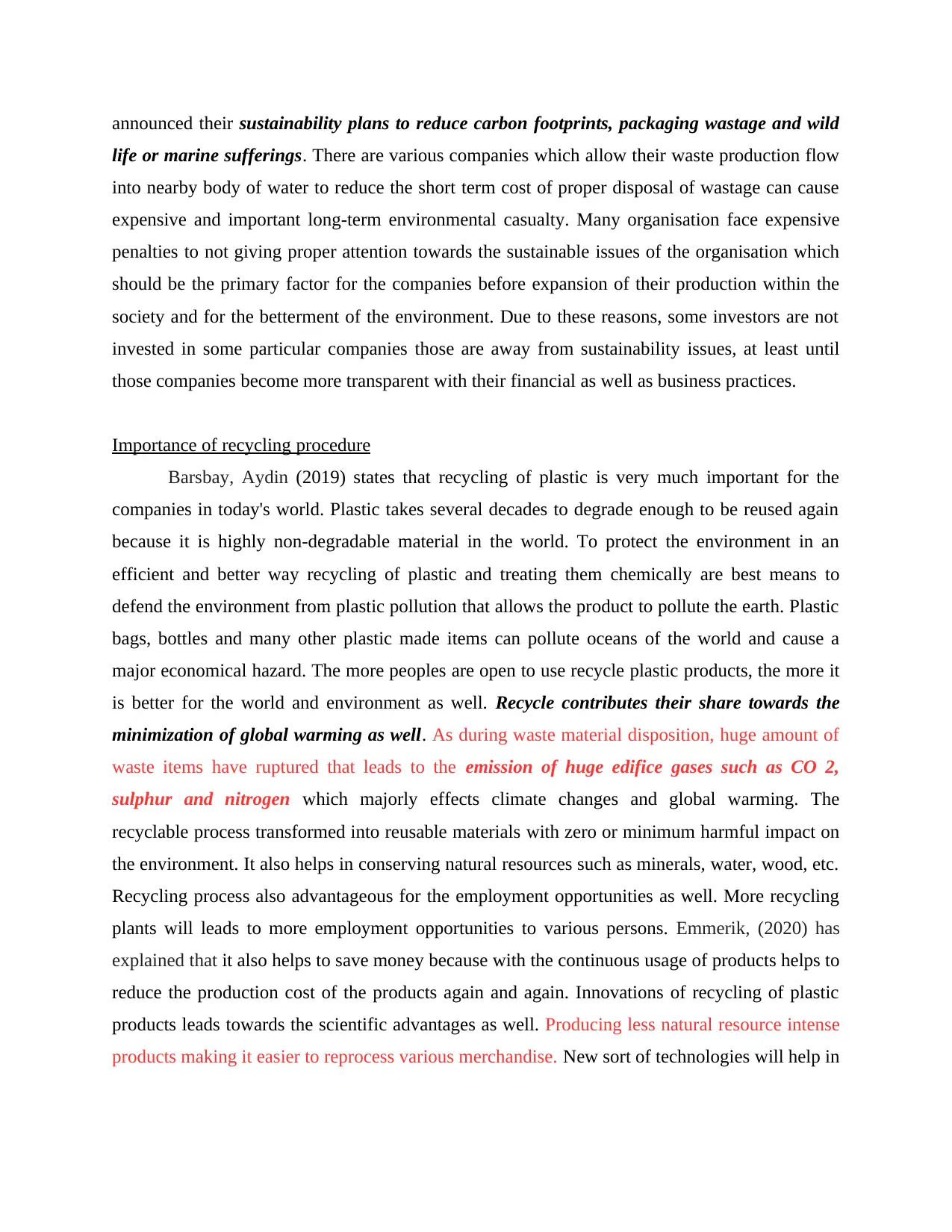
announced their sustainability plans to reduce carbon footprints, packaging wastage and wild
life or marine sufferings. There are various companies which allow their waste production flow
into nearby body of water to reduce the short term cost of proper disposal of wastage can cause
expensive and important long-term environmental casualty. Many organisation face expensive
penalties to not giving proper attention towards the sustainable issues of the organisation which
should be the primary factor for the companies before expansion of their production within the
society and for the betterment of the environment. Due to these reasons, some investors are not
invested in some particular companies those are away from sustainability issues, at least until
those companies become more transparent with their financial as well as business practices.
Importance of recycling procedure
Barsbay, Aydin (2019) states that recycling of plastic is very much important for the
companies in today's world. Plastic takes several decades to degrade enough to be reused again
because it is highly non-degradable material in the world. To protect the environment in an
efficient and better way recycling of plastic and treating them chemically are best means to
defend the environment from plastic pollution that allows the product to pollute the earth. Plastic
bags, bottles and many other plastic made items can pollute oceans of the world and cause a
major economical hazard. The more peoples are open to use recycle plastic products, the more it
is better for the world and environment as well. Recycle contributes their share towards the
minimization of global warming as well. As during waste material disposition, huge amount of
waste items have ruptured that leads to the emission of huge edifice gases such as CO 2,
sulphur and nitrogen which majorly effects climate changes and global warming. The
recyclable process transformed into reusable materials with zero or minimum harmful impact on
the environment. It also helps in conserving natural resources such as minerals, water, wood, etc.
Recycling process also advantageous for the employment opportunities as well. More recycling
plants will leads to more employment opportunities to various persons. Emmerik, (2020) has
explained that it also helps to save money because with the continuous usage of products helps to
reduce the production cost of the products again and again. Innovations of recycling of plastic
products leads towards the scientific advantages as well. Producing less natural resource intense
products making it easier to reprocess various merchandise. New sort of technologies will help in
life or marine sufferings. There are various companies which allow their waste production flow
into nearby body of water to reduce the short term cost of proper disposal of wastage can cause
expensive and important long-term environmental casualty. Many organisation face expensive
penalties to not giving proper attention towards the sustainable issues of the organisation which
should be the primary factor for the companies before expansion of their production within the
society and for the betterment of the environment. Due to these reasons, some investors are not
invested in some particular companies those are away from sustainability issues, at least until
those companies become more transparent with their financial as well as business practices.
Importance of recycling procedure
Barsbay, Aydin (2019) states that recycling of plastic is very much important for the
companies in today's world. Plastic takes several decades to degrade enough to be reused again
because it is highly non-degradable material in the world. To protect the environment in an
efficient and better way recycling of plastic and treating them chemically are best means to
defend the environment from plastic pollution that allows the product to pollute the earth. Plastic
bags, bottles and many other plastic made items can pollute oceans of the world and cause a
major economical hazard. The more peoples are open to use recycle plastic products, the more it
is better for the world and environment as well. Recycle contributes their share towards the
minimization of global warming as well. As during waste material disposition, huge amount of
waste items have ruptured that leads to the emission of huge edifice gases such as CO 2,
sulphur and nitrogen which majorly effects climate changes and global warming. The
recyclable process transformed into reusable materials with zero or minimum harmful impact on
the environment. It also helps in conserving natural resources such as minerals, water, wood, etc.
Recycling process also advantageous for the employment opportunities as well. More recycling
plants will leads to more employment opportunities to various persons. Emmerik, (2020) has
explained that it also helps to save money because with the continuous usage of products helps to
reduce the production cost of the products again and again. Innovations of recycling of plastic
products leads towards the scientific advantages as well. Producing less natural resource intense
products making it easier to reprocess various merchandise. New sort of technologies will help in
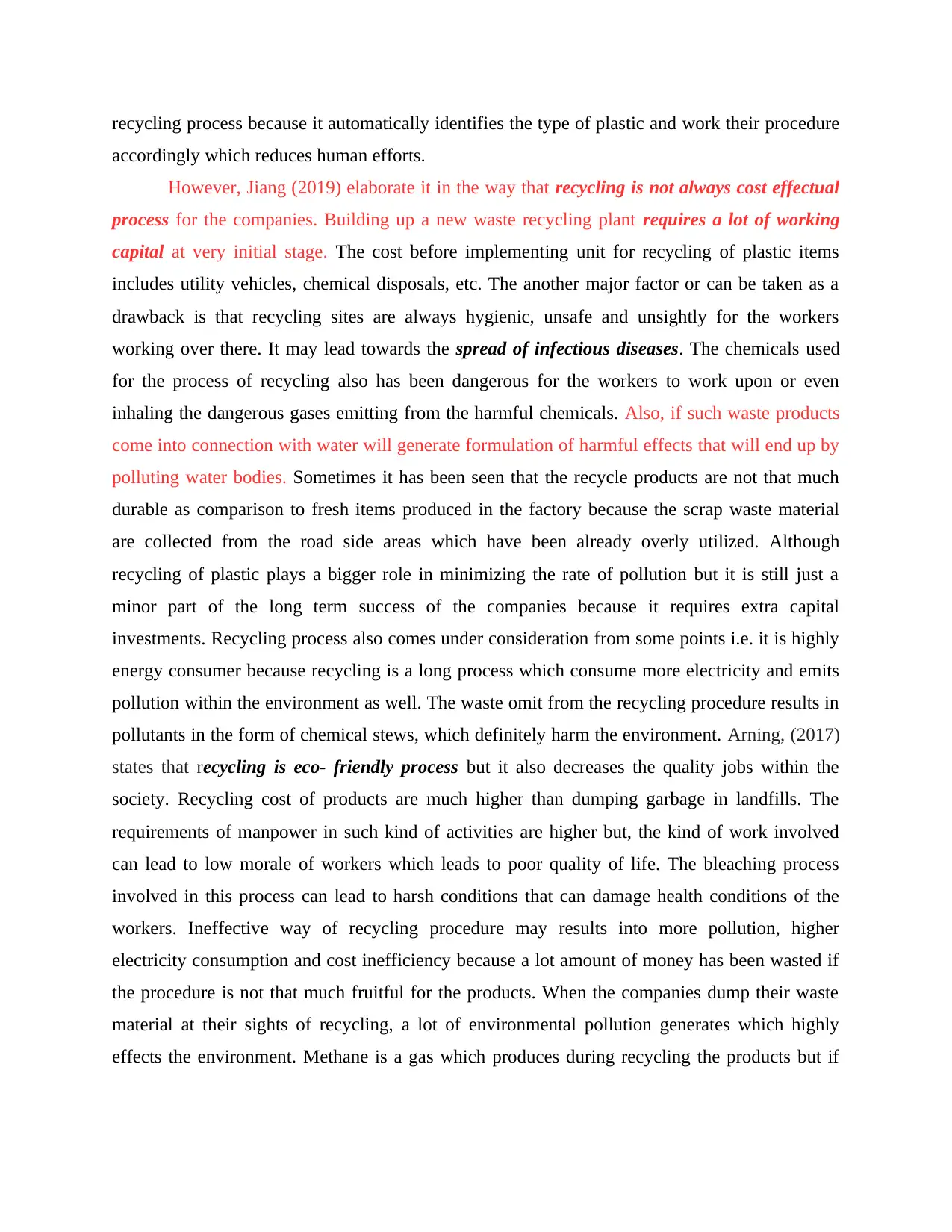
recycling process because it automatically identifies the type of plastic and work their procedure
accordingly which reduces human efforts.
However, Jiang (2019) elaborate it in the way that recycling is not always cost effectual
process for the companies. Building up a new waste recycling plant requires a lot of working
capital at very initial stage. The cost before implementing unit for recycling of plastic items
includes utility vehicles, chemical disposals, etc. The another major factor or can be taken as a
drawback is that recycling sites are always hygienic, unsafe and unsightly for the workers
working over there. It may lead towards the spread of infectious diseases. The chemicals used
for the process of recycling also has been dangerous for the workers to work upon or even
inhaling the dangerous gases emitting from the harmful chemicals. Also, if such waste products
come into connection with water will generate formulation of harmful effects that will end up by
polluting water bodies. Sometimes it has been seen that the recycle products are not that much
durable as comparison to fresh items produced in the factory because the scrap waste material
are collected from the road side areas which have been already overly utilized. Although
recycling of plastic plays a bigger role in minimizing the rate of pollution but it is still just a
minor part of the long term success of the companies because it requires extra capital
investments. Recycling process also comes under consideration from some points i.e. it is highly
energy consumer because recycling is a long process which consume more electricity and emits
pollution within the environment as well. The waste omit from the recycling procedure results in
pollutants in the form of chemical stews, which definitely harm the environment. Arning, (2017)
states that recycling is eco- friendly process but it also decreases the quality jobs within the
society. Recycling cost of products are much higher than dumping garbage in landfills. The
requirements of manpower in such kind of activities are higher but, the kind of work involved
can lead to low morale of workers which leads to poor quality of life. The bleaching process
involved in this process can lead to harsh conditions that can damage health conditions of the
workers. Ineffective way of recycling procedure may results into more pollution, higher
electricity consumption and cost inefficiency because a lot amount of money has been wasted if
the procedure is not that much fruitful for the products. When the companies dump their waste
material at their sights of recycling, a lot of environmental pollution generates which highly
effects the environment. Methane is a gas which produces during recycling the products but if
accordingly which reduces human efforts.
However, Jiang (2019) elaborate it in the way that recycling is not always cost effectual
process for the companies. Building up a new waste recycling plant requires a lot of working
capital at very initial stage. The cost before implementing unit for recycling of plastic items
includes utility vehicles, chemical disposals, etc. The another major factor or can be taken as a
drawback is that recycling sites are always hygienic, unsafe and unsightly for the workers
working over there. It may lead towards the spread of infectious diseases. The chemicals used
for the process of recycling also has been dangerous for the workers to work upon or even
inhaling the dangerous gases emitting from the harmful chemicals. Also, if such waste products
come into connection with water will generate formulation of harmful effects that will end up by
polluting water bodies. Sometimes it has been seen that the recycle products are not that much
durable as comparison to fresh items produced in the factory because the scrap waste material
are collected from the road side areas which have been already overly utilized. Although
recycling of plastic plays a bigger role in minimizing the rate of pollution but it is still just a
minor part of the long term success of the companies because it requires extra capital
investments. Recycling process also comes under consideration from some points i.e. it is highly
energy consumer because recycling is a long process which consume more electricity and emits
pollution within the environment as well. The waste omit from the recycling procedure results in
pollutants in the form of chemical stews, which definitely harm the environment. Arning, (2017)
states that recycling is eco- friendly process but it also decreases the quality jobs within the
society. Recycling cost of products are much higher than dumping garbage in landfills. The
requirements of manpower in such kind of activities are higher but, the kind of work involved
can lead to low morale of workers which leads to poor quality of life. The bleaching process
involved in this process can lead to harsh conditions that can damage health conditions of the
workers. Ineffective way of recycling procedure may results into more pollution, higher
electricity consumption and cost inefficiency because a lot amount of money has been wasted if
the procedure is not that much fruitful for the products. When the companies dump their waste
material at their sights of recycling, a lot of environmental pollution generates which highly
effects the environment. Methane is a gas which produces during recycling the products but if
⊘ This is a preview!⊘
Do you want full access?
Subscribe today to unlock all pages.

Trusted by 1+ million students worldwide
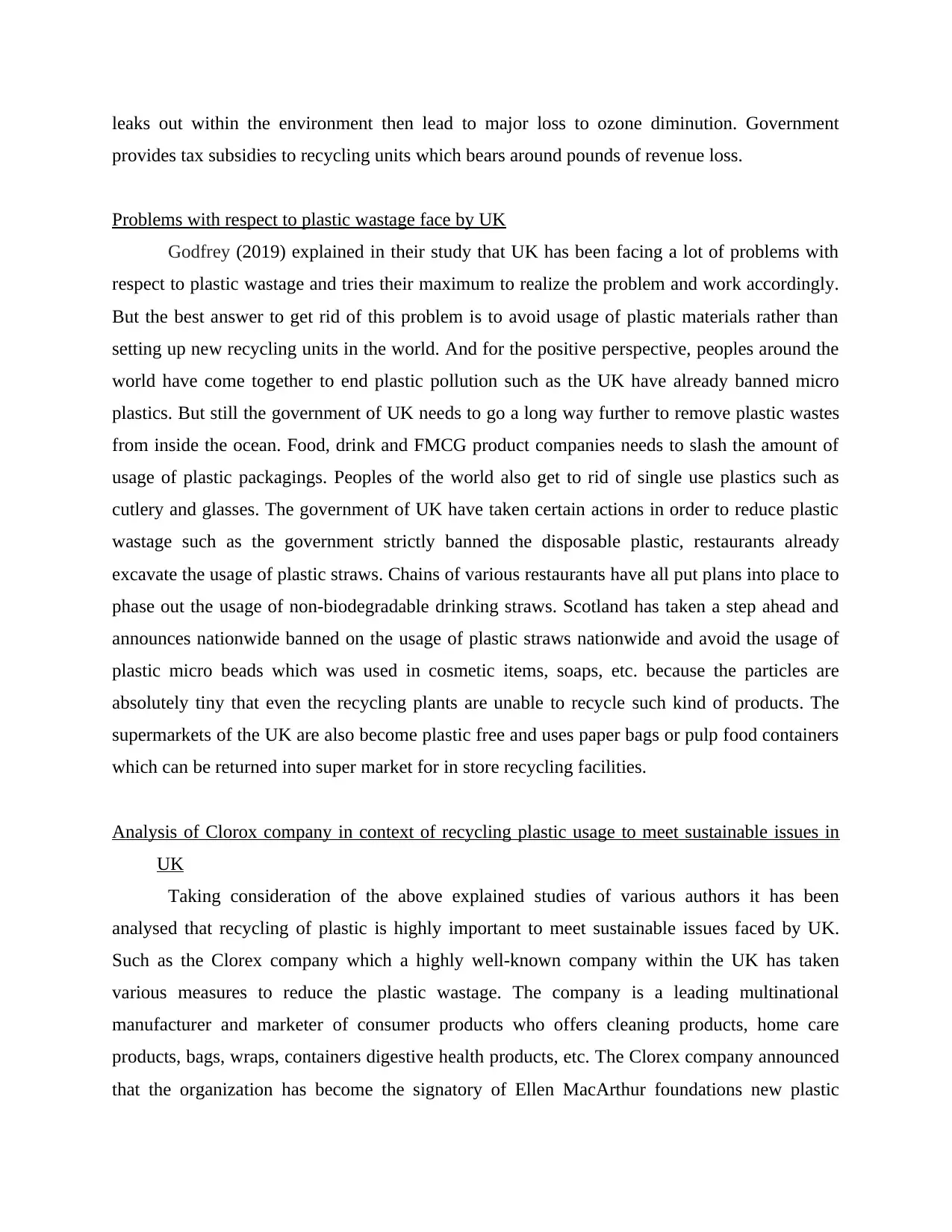
leaks out within the environment then lead to major loss to ozone diminution. Government
provides tax subsidies to recycling units which bears around pounds of revenue loss.
Problems with respect to plastic wastage face by UK
Godfrey (2019) explained in their study that UK has been facing a lot of problems with
respect to plastic wastage and tries their maximum to realize the problem and work accordingly.
But the best answer to get rid of this problem is to avoid usage of plastic materials rather than
setting up new recycling units in the world. And for the positive perspective, peoples around the
world have come together to end plastic pollution such as the UK have already banned micro
plastics. But still the government of UK needs to go a long way further to remove plastic wastes
from inside the ocean. Food, drink and FMCG product companies needs to slash the amount of
usage of plastic packagings. Peoples of the world also get to rid of single use plastics such as
cutlery and glasses. The government of UK have taken certain actions in order to reduce plastic
wastage such as the government strictly banned the disposable plastic, restaurants already
excavate the usage of plastic straws. Chains of various restaurants have all put plans into place to
phase out the usage of non-biodegradable drinking straws. Scotland has taken a step ahead and
announces nationwide banned on the usage of plastic straws nationwide and avoid the usage of
plastic micro beads which was used in cosmetic items, soaps, etc. because the particles are
absolutely tiny that even the recycling plants are unable to recycle such kind of products. The
supermarkets of the UK are also become plastic free and uses paper bags or pulp food containers
which can be returned into super market for in store recycling facilities.
Analysis of Clorox company in context of recycling plastic usage to meet sustainable issues in
UK
Taking consideration of the above explained studies of various authors it has been
analysed that recycling of plastic is highly important to meet sustainable issues faced by UK.
Such as the Clorex company which a highly well-known company within the UK has taken
various measures to reduce the plastic wastage. The company is a leading multinational
manufacturer and marketer of consumer products who offers cleaning products, home care
products, bags, wraps, containers digestive health products, etc. The Clorex company announced
that the organization has become the signatory of Ellen MacArthur foundations new plastic
provides tax subsidies to recycling units which bears around pounds of revenue loss.
Problems with respect to plastic wastage face by UK
Godfrey (2019) explained in their study that UK has been facing a lot of problems with
respect to plastic wastage and tries their maximum to realize the problem and work accordingly.
But the best answer to get rid of this problem is to avoid usage of plastic materials rather than
setting up new recycling units in the world. And for the positive perspective, peoples around the
world have come together to end plastic pollution such as the UK have already banned micro
plastics. But still the government of UK needs to go a long way further to remove plastic wastes
from inside the ocean. Food, drink and FMCG product companies needs to slash the amount of
usage of plastic packagings. Peoples of the world also get to rid of single use plastics such as
cutlery and glasses. The government of UK have taken certain actions in order to reduce plastic
wastage such as the government strictly banned the disposable plastic, restaurants already
excavate the usage of plastic straws. Chains of various restaurants have all put plans into place to
phase out the usage of non-biodegradable drinking straws. Scotland has taken a step ahead and
announces nationwide banned on the usage of plastic straws nationwide and avoid the usage of
plastic micro beads which was used in cosmetic items, soaps, etc. because the particles are
absolutely tiny that even the recycling plants are unable to recycle such kind of products. The
supermarkets of the UK are also become plastic free and uses paper bags or pulp food containers
which can be returned into super market for in store recycling facilities.
Analysis of Clorox company in context of recycling plastic usage to meet sustainable issues in
UK
Taking consideration of the above explained studies of various authors it has been
analysed that recycling of plastic is highly important to meet sustainable issues faced by UK.
Such as the Clorex company which a highly well-known company within the UK has taken
various measures to reduce the plastic wastage. The company is a leading multinational
manufacturer and marketer of consumer products who offers cleaning products, home care
products, bags, wraps, containers digestive health products, etc. The Clorex company announced
that the organization has become the signatory of Ellen MacArthur foundations new plastic
Paraphrase This Document
Need a fresh take? Get an instant paraphrase of this document with our AI Paraphraser
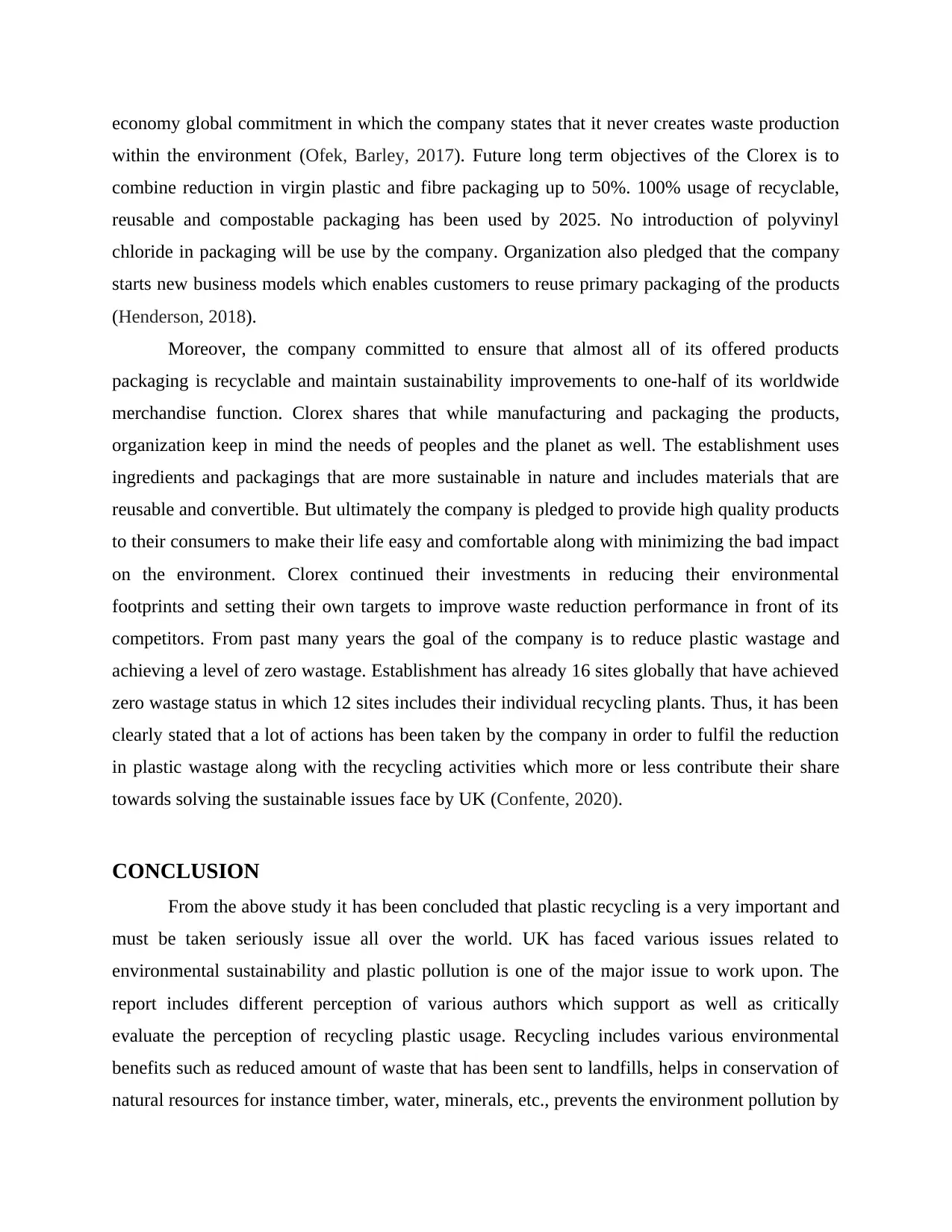
economy global commitment in which the company states that it never creates waste production
within the environment (Ofek, Barley, 2017). Future long term objectives of the Clorex is to
combine reduction in virgin plastic and fibre packaging up to 50%. 100% usage of recyclable,
reusable and compostable packaging has been used by 2025. No introduction of polyvinyl
chloride in packaging will be use by the company. Organization also pledged that the company
starts new business models which enables customers to reuse primary packaging of the products
(Henderson, 2018).
Moreover, the company committed to ensure that almost all of its offered products
packaging is recyclable and maintain sustainability improvements to one-half of its worldwide
merchandise function. Clorex shares that while manufacturing and packaging the products,
organization keep in mind the needs of peoples and the planet as well. The establishment uses
ingredients and packagings that are more sustainable in nature and includes materials that are
reusable and convertible. But ultimately the company is pledged to provide high quality products
to their consumers to make their life easy and comfortable along with minimizing the bad impact
on the environment. Clorex continued their investments in reducing their environmental
footprints and setting their own targets to improve waste reduction performance in front of its
competitors. From past many years the goal of the company is to reduce plastic wastage and
achieving a level of zero wastage. Establishment has already 16 sites globally that have achieved
zero wastage status in which 12 sites includes their individual recycling plants. Thus, it has been
clearly stated that a lot of actions has been taken by the company in order to fulfil the reduction
in plastic wastage along with the recycling activities which more or less contribute their share
towards solving the sustainable issues face by UK (Confente, 2020).
CONCLUSION
From the above study it has been concluded that plastic recycling is a very important and
must be taken seriously issue all over the world. UK has faced various issues related to
environmental sustainability and plastic pollution is one of the major issue to work upon. The
report includes different perception of various authors which support as well as critically
evaluate the perception of recycling plastic usage. Recycling includes various environmental
benefits such as reduced amount of waste that has been sent to landfills, helps in conservation of
natural resources for instance timber, water, minerals, etc., prevents the environment pollution by
within the environment (Ofek, Barley, 2017). Future long term objectives of the Clorex is to
combine reduction in virgin plastic and fibre packaging up to 50%. 100% usage of recyclable,
reusable and compostable packaging has been used by 2025. No introduction of polyvinyl
chloride in packaging will be use by the company. Organization also pledged that the company
starts new business models which enables customers to reuse primary packaging of the products
(Henderson, 2018).
Moreover, the company committed to ensure that almost all of its offered products
packaging is recyclable and maintain sustainability improvements to one-half of its worldwide
merchandise function. Clorex shares that while manufacturing and packaging the products,
organization keep in mind the needs of peoples and the planet as well. The establishment uses
ingredients and packagings that are more sustainable in nature and includes materials that are
reusable and convertible. But ultimately the company is pledged to provide high quality products
to their consumers to make their life easy and comfortable along with minimizing the bad impact
on the environment. Clorex continued their investments in reducing their environmental
footprints and setting their own targets to improve waste reduction performance in front of its
competitors. From past many years the goal of the company is to reduce plastic wastage and
achieving a level of zero wastage. Establishment has already 16 sites globally that have achieved
zero wastage status in which 12 sites includes their individual recycling plants. Thus, it has been
clearly stated that a lot of actions has been taken by the company in order to fulfil the reduction
in plastic wastage along with the recycling activities which more or less contribute their share
towards solving the sustainable issues face by UK (Confente, 2020).
CONCLUSION
From the above study it has been concluded that plastic recycling is a very important and
must be taken seriously issue all over the world. UK has faced various issues related to
environmental sustainability and plastic pollution is one of the major issue to work upon. The
report includes different perception of various authors which support as well as critically
evaluate the perception of recycling plastic usage. Recycling includes various environmental
benefits such as reduced amount of waste that has been sent to landfills, helps in conservation of
natural resources for instance timber, water, minerals, etc., prevents the environment pollution by
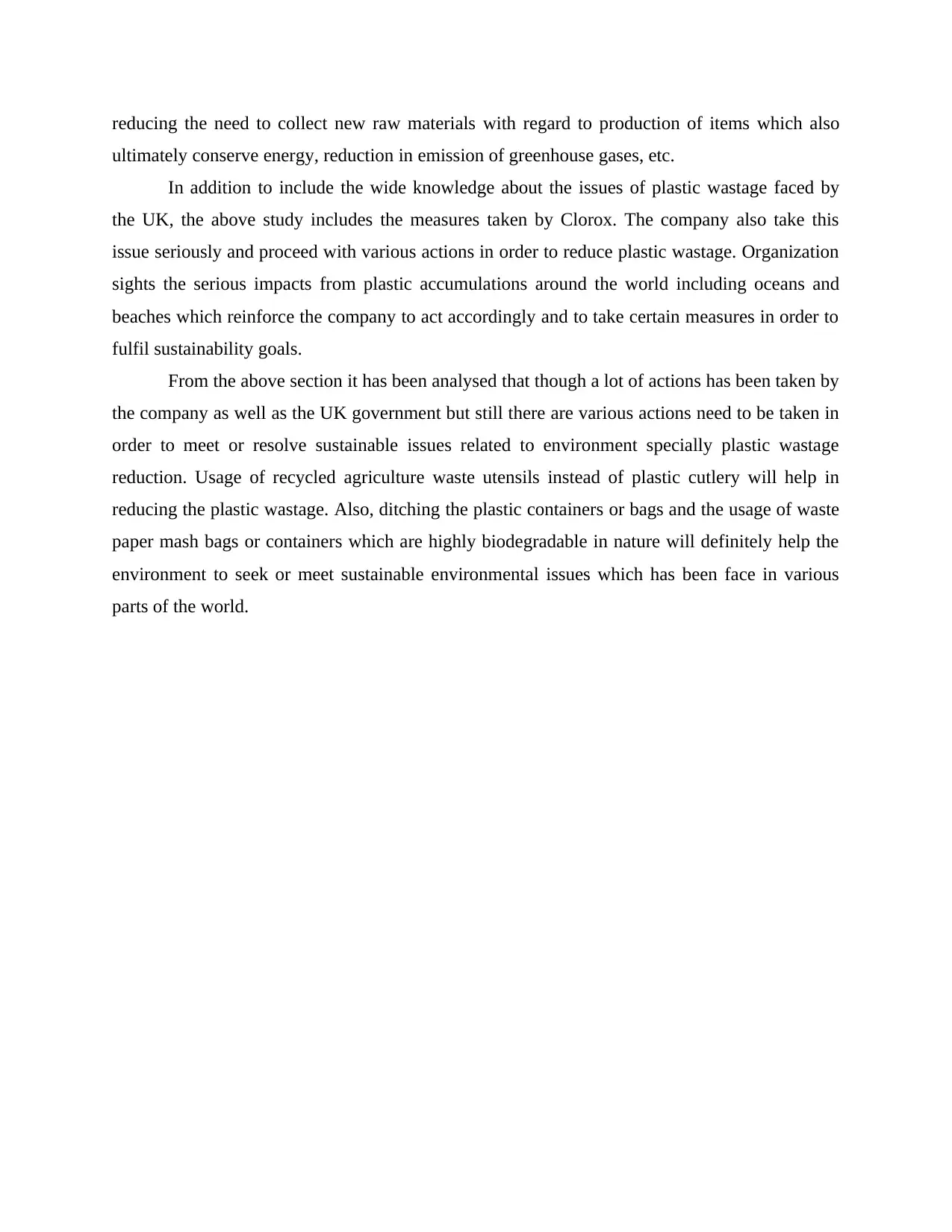
reducing the need to collect new raw materials with regard to production of items which also
ultimately conserve energy, reduction in emission of greenhouse gases, etc.
In addition to include the wide knowledge about the issues of plastic wastage faced by
the UK, the above study includes the measures taken by Clorox. The company also take this
issue seriously and proceed with various actions in order to reduce plastic wastage. Organization
sights the serious impacts from plastic accumulations around the world including oceans and
beaches which reinforce the company to act accordingly and to take certain measures in order to
fulfil sustainability goals.
From the above section it has been analysed that though a lot of actions has been taken by
the company as well as the UK government but still there are various actions need to be taken in
order to meet or resolve sustainable issues related to environment specially plastic wastage
reduction. Usage of recycled agriculture waste utensils instead of plastic cutlery will help in
reducing the plastic wastage. Also, ditching the plastic containers or bags and the usage of waste
paper mash bags or containers which are highly biodegradable in nature will definitely help the
environment to seek or meet sustainable environmental issues which has been face in various
parts of the world.
ultimately conserve energy, reduction in emission of greenhouse gases, etc.
In addition to include the wide knowledge about the issues of plastic wastage faced by
the UK, the above study includes the measures taken by Clorox. The company also take this
issue seriously and proceed with various actions in order to reduce plastic wastage. Organization
sights the serious impacts from plastic accumulations around the world including oceans and
beaches which reinforce the company to act accordingly and to take certain measures in order to
fulfil sustainability goals.
From the above section it has been analysed that though a lot of actions has been taken by
the company as well as the UK government but still there are various actions need to be taken in
order to meet or resolve sustainable issues related to environment specially plastic wastage
reduction. Usage of recycled agriculture waste utensils instead of plastic cutlery will help in
reducing the plastic wastage. Also, ditching the plastic containers or bags and the usage of waste
paper mash bags or containers which are highly biodegradable in nature will definitely help the
environment to seek or meet sustainable environmental issues which has been face in various
parts of the world.
⊘ This is a preview!⊘
Do you want full access?
Subscribe today to unlock all pages.

Trusted by 1+ million students worldwide
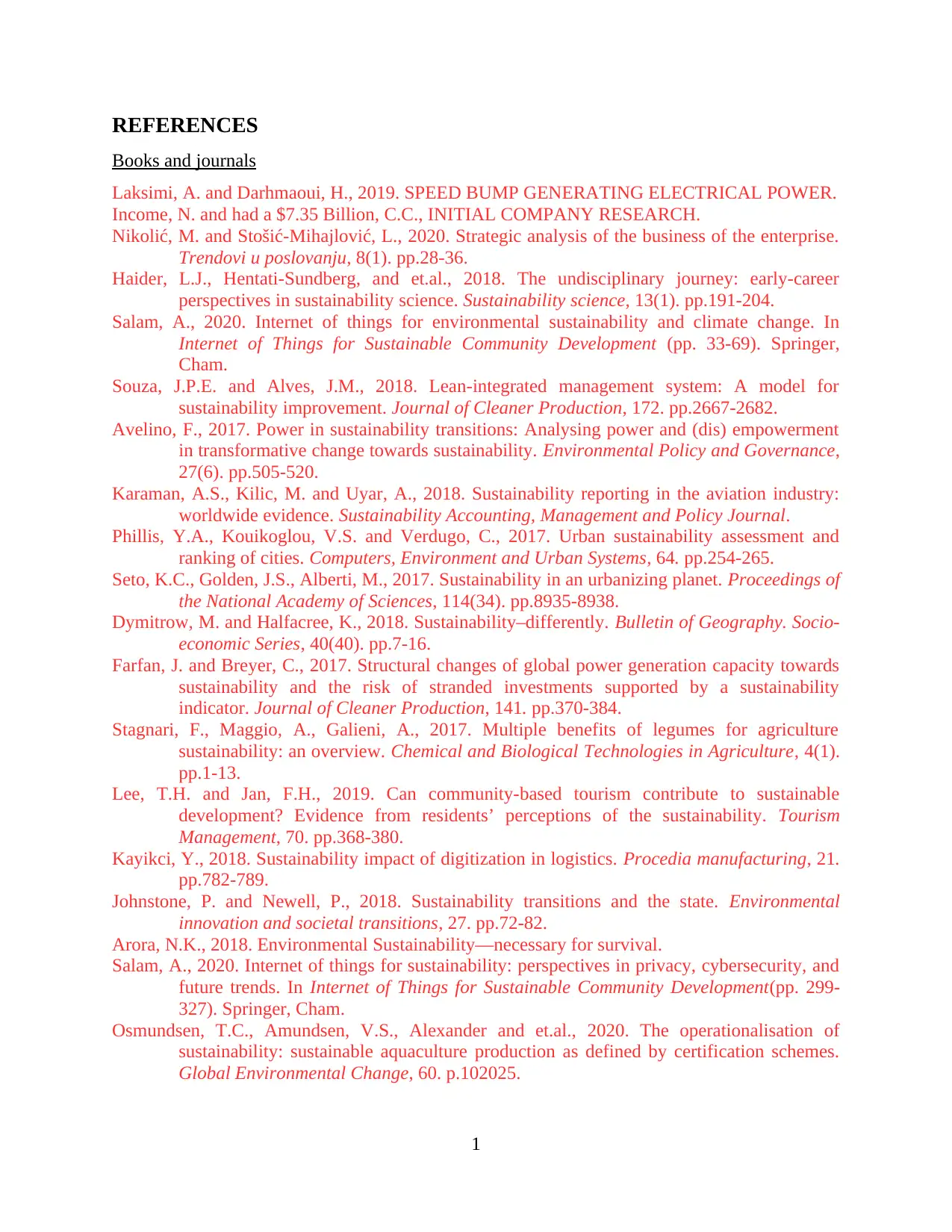
REFERENCES
Books and journals
Laksimi, A. and Darhmaoui, H., 2019. SPEED BUMP GENERATING ELECTRICAL POWER.
Income, N. and had a $7.35 Billion, C.C., INITIAL COMPANY RESEARCH.
Nikolić, M. and Stošić-Mihajlović, L., 2020. Strategic analysis of the business of the enterprise.
Trendovi u poslovanju, 8(1). pp.28-36.
Haider, L.J., Hentati-Sundberg, and et.al., 2018. The undisciplinary journey: early-career
perspectives in sustainability science. Sustainability science, 13(1). pp.191-204.
Salam, A., 2020. Internet of things for environmental sustainability and climate change. In
Internet of Things for Sustainable Community Development (pp. 33-69). Springer,
Cham.
Souza, J.P.E. and Alves, J.M., 2018. Lean-integrated management system: A model for
sustainability improvement. Journal of Cleaner Production, 172. pp.2667-2682.
Avelino, F., 2017. Power in sustainability transitions: Analysing power and (dis) empowerment
in transformative change towards sustainability. Environmental Policy and Governance,
27(6). pp.505-520.
Karaman, A.S., Kilic, M. and Uyar, A., 2018. Sustainability reporting in the aviation industry:
worldwide evidence. Sustainability Accounting, Management and Policy Journal.
Phillis, Y.A., Kouikoglou, V.S. and Verdugo, C., 2017. Urban sustainability assessment and
ranking of cities. Computers, Environment and Urban Systems, 64. pp.254-265.
Seto, K.C., Golden, J.S., Alberti, M., 2017. Sustainability in an urbanizing planet. Proceedings of
the National Academy of Sciences, 114(34). pp.8935-8938.
Dymitrow, M. and Halfacree, K., 2018. Sustainability–differently. Bulletin of Geography. Socio-
economic Series, 40(40). pp.7-16.
Farfan, J. and Breyer, C., 2017. Structural changes of global power generation capacity towards
sustainability and the risk of stranded investments supported by a sustainability
indicator. Journal of Cleaner Production, 141. pp.370-384.
Stagnari, F., Maggio, A., Galieni, A., 2017. Multiple benefits of legumes for agriculture
sustainability: an overview. Chemical and Biological Technologies in Agriculture, 4(1).
pp.1-13.
Lee, T.H. and Jan, F.H., 2019. Can community-based tourism contribute to sustainable
development? Evidence from residents’ perceptions of the sustainability. Tourism
Management, 70. pp.368-380.
Kayikci, Y., 2018. Sustainability impact of digitization in logistics. Procedia manufacturing, 21.
pp.782-789.
Johnstone, P. and Newell, P., 2018. Sustainability transitions and the state. Environmental
innovation and societal transitions, 27. pp.72-82.
Arora, N.K., 2018. Environmental Sustainability—necessary for survival.
Salam, A., 2020. Internet of things for sustainability: perspectives in privacy, cybersecurity, and
future trends. In Internet of Things for Sustainable Community Development(pp. 299-
327). Springer, Cham.
Osmundsen, T.C., Amundsen, V.S., Alexander and et.al., 2020. The operationalisation of
sustainability: sustainable aquaculture production as defined by certification schemes.
Global Environmental Change, 60. p.102025.
1
Books and journals
Laksimi, A. and Darhmaoui, H., 2019. SPEED BUMP GENERATING ELECTRICAL POWER.
Income, N. and had a $7.35 Billion, C.C., INITIAL COMPANY RESEARCH.
Nikolić, M. and Stošić-Mihajlović, L., 2020. Strategic analysis of the business of the enterprise.
Trendovi u poslovanju, 8(1). pp.28-36.
Haider, L.J., Hentati-Sundberg, and et.al., 2018. The undisciplinary journey: early-career
perspectives in sustainability science. Sustainability science, 13(1). pp.191-204.
Salam, A., 2020. Internet of things for environmental sustainability and climate change. In
Internet of Things for Sustainable Community Development (pp. 33-69). Springer,
Cham.
Souza, J.P.E. and Alves, J.M., 2018. Lean-integrated management system: A model for
sustainability improvement. Journal of Cleaner Production, 172. pp.2667-2682.
Avelino, F., 2017. Power in sustainability transitions: Analysing power and (dis) empowerment
in transformative change towards sustainability. Environmental Policy and Governance,
27(6). pp.505-520.
Karaman, A.S., Kilic, M. and Uyar, A., 2018. Sustainability reporting in the aviation industry:
worldwide evidence. Sustainability Accounting, Management and Policy Journal.
Phillis, Y.A., Kouikoglou, V.S. and Verdugo, C., 2017. Urban sustainability assessment and
ranking of cities. Computers, Environment and Urban Systems, 64. pp.254-265.
Seto, K.C., Golden, J.S., Alberti, M., 2017. Sustainability in an urbanizing planet. Proceedings of
the National Academy of Sciences, 114(34). pp.8935-8938.
Dymitrow, M. and Halfacree, K., 2018. Sustainability–differently. Bulletin of Geography. Socio-
economic Series, 40(40). pp.7-16.
Farfan, J. and Breyer, C., 2017. Structural changes of global power generation capacity towards
sustainability and the risk of stranded investments supported by a sustainability
indicator. Journal of Cleaner Production, 141. pp.370-384.
Stagnari, F., Maggio, A., Galieni, A., 2017. Multiple benefits of legumes for agriculture
sustainability: an overview. Chemical and Biological Technologies in Agriculture, 4(1).
pp.1-13.
Lee, T.H. and Jan, F.H., 2019. Can community-based tourism contribute to sustainable
development? Evidence from residents’ perceptions of the sustainability. Tourism
Management, 70. pp.368-380.
Kayikci, Y., 2018. Sustainability impact of digitization in logistics. Procedia manufacturing, 21.
pp.782-789.
Johnstone, P. and Newell, P., 2018. Sustainability transitions and the state. Environmental
innovation and societal transitions, 27. pp.72-82.
Arora, N.K., 2018. Environmental Sustainability—necessary for survival.
Salam, A., 2020. Internet of things for sustainability: perspectives in privacy, cybersecurity, and
future trends. In Internet of Things for Sustainable Community Development(pp. 299-
327). Springer, Cham.
Osmundsen, T.C., Amundsen, V.S., Alexander and et.al., 2020. The operationalisation of
sustainability: sustainable aquaculture production as defined by certification schemes.
Global Environmental Change, 60. p.102025.
1
Paraphrase This Document
Need a fresh take? Get an instant paraphrase of this document with our AI Paraphraser

Al‐Shaer, H. and Zaman, M., 2018. Credibility of sustainability reports: The contribution of
audit committees. Business strategy and the environment, 27(7). pp.973-986.
2
audit committees. Business strategy and the environment, 27(7). pp.973-986.
2
1 out of 11
Related Documents
Your All-in-One AI-Powered Toolkit for Academic Success.
+13062052269
info@desklib.com
Available 24*7 on WhatsApp / Email
![[object Object]](/_next/static/media/star-bottom.7253800d.svg)
Unlock your academic potential
Copyright © 2020–2026 A2Z Services. All Rights Reserved. Developed and managed by ZUCOL.




